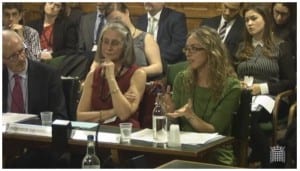ASPIRES 2 responds to inquiry on careers education
By IOE Blog Editor, on 10 February 2016
— Emily MacLeod
In January, ASPIRES 2 researchers Professor Louise Archer and Dr. Julie Moote submitted evidence to the House of Commons Sub-Committee on Education, Skills and the Economy’s inquiry into careers advice and guidance. The purpose of the inquiry was to assess the quality and impartiality of current careers provision, and evaluate how careers advice in schools and colleges can help to match skills with labour market needs. Following the submission Professor Louise Archer gave oral evidence to the Committee at the House of Commons on 8th February.
The evidence submitted used findings from ASPIRES 2’s national survey of over 13,000 15-16 year olds to report on students’ experiences of, and satisfaction with, careers education and work experience.

Findings:
Less than two thirds of Year 11 students have received careers education, and less than half of all students have had work experience. Girls, minority ethnic students, working-class students, lower-attaining students and those who are unsure of their aspirations are amongst the least likely to have access to careers education. The result is that careers education provision is patterned by social inequalities.
The likelihood of a student having participated in work experience varied by region and by career area; students aspiring to science and law are the least likely to have had work experience, and students with high science aspirations are significantly more likely than their non-science aspirant peers to have had careers education.
Recommendations:
In order to encourage equity of access to careers education we have recommended that careers educators and policy makers must:
- focus on careers education ‘participation’, not just ‘provision’ – i.e. who is, and is not, taking up different careers education offers,
- monitor, evaluate and take steps to address inequalities in terms of which students do/ do not access and participate in careers education and work experience,
- be able to access dedicated resourcing to target, engage and support disadvantaged groups,
- make efforts to address regional differences in work experience and explore ways of providing more work experience in fields such as science and law,
- take particular care with respect to schemes and opportunities that are offered on an ‘opt in’ and/or ‘selective’ basis, to ensure that these do not contribute to the further reinforcement of patterns of unequal participation in careers education and work experience.
Read our full written submission here.
Watch Professor Louise Archer giving evidence, and find out more about the Sub-Committee on Education, Skills and the Economy’s inquiry here.
Read the Sub-Committee’s summary report on careers education, information, advice and guidance here.
 Close
Close



